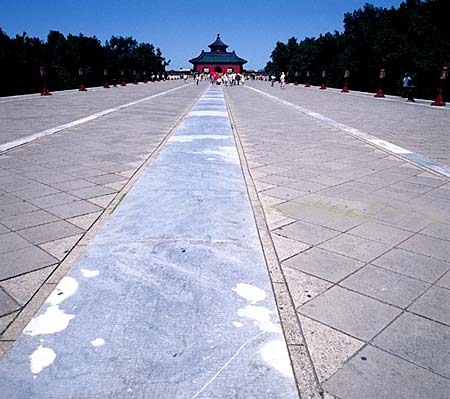Secrets of the Temple of Heaven
Updated: 2007-07-27 08:29

Danbi Bridge was the only way for the emperor to get to the Hall of Prayer for Good Harvests. The central path was reserved for divine gods, the path on the left was reserved for the emperor and court officials used the path on the right
You may ask, 'it's obviously a road, so why is it called a bridge?' The bridge is four meters above ground, and a tunnel passes under the path, so it's correct to call it a bridge.
The tunnel is called Jin Sheng Gate, meaning the way for sacrifices. Cows and sheep were herded into the Butchery Pavilion to be sacrificed. Of course these animals weren't allowed to walk on the sacred Danbi Bridge, so the tunnel was built for them, creating China's first cloverleaf junction. The tunnel is also called the Gate of Hell, and no one dares go near it.
The famous Echo Wall at the Heart of Heavenly Stone
The Heart of Heavenly Stone lies on the center of the Circular Mound Altar. In the past, when emperors delivered ceremonial speeches here a magical thing happened: even if the emperor spoke quietly, his voice sounded so powerful it could be heard clearly by the whole audience. The emperors interpreted this phenomenon as evidence that they were TianZi (the sons of God), and proclaimed this mysterious phenomenon meant everyone must obey them or run the risk of being an enemy of God.
Of course, there is a scientific reason behind this phenomenon. Sounds from
the Heart of Heavenly Stone are rapidly echoed by the surrounding stone walls,
and the loud voice heard by emperors and officials is actually a mixture of the
original voice and echoes. But because the distance between the Heavenly Center
Stone and the stone walls is short, the original sound can hardly be
distinguished from the echo so people heard a louder voice.
 | 1 | 2 | 3 | 4 |  |

